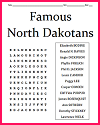Students are asked to conduct independent research on the state of North Dakota, writing their findings and citing their sources.
Click here to print. Answers will vary.
North Dakota's economy is deeply rooted in agriculture and energy, with both sectors playing a central role in the state's development and identity. The state is one of the leading agricultural producers in the United States due to its fertile soil, wide-open plains, and favorable climate for growing crops. Major agricultural products include wheat, especially hard red spring wheat, barley, corn, soybeans, and sunflowers. North Dakota also leads the nation in the production of flaxseed and canola. Livestock farming, particularly beef cattle, is also significant in many rural areas.
In addition to its strong agricultural base, North Dakota has a thriving energy sector. The discovery and development of the Bakken shale formation have made the state one of the top oil-producing regions in the U.S. This oil boom has driven economic growth, created jobs, and contributed to the state's low unemployment rate. North Dakota also has significant natural gas reserves and produces electricity through coal and wind energy.
Manufacturing in the state is closely tied to its natural resources, with industries focusing on food processing, farm equipment, and energy-related products. Overall, North Dakota's blend of productive farmland and energy resources makes it a vital contributor to both the nation's food supply and energy independence.
|




















































